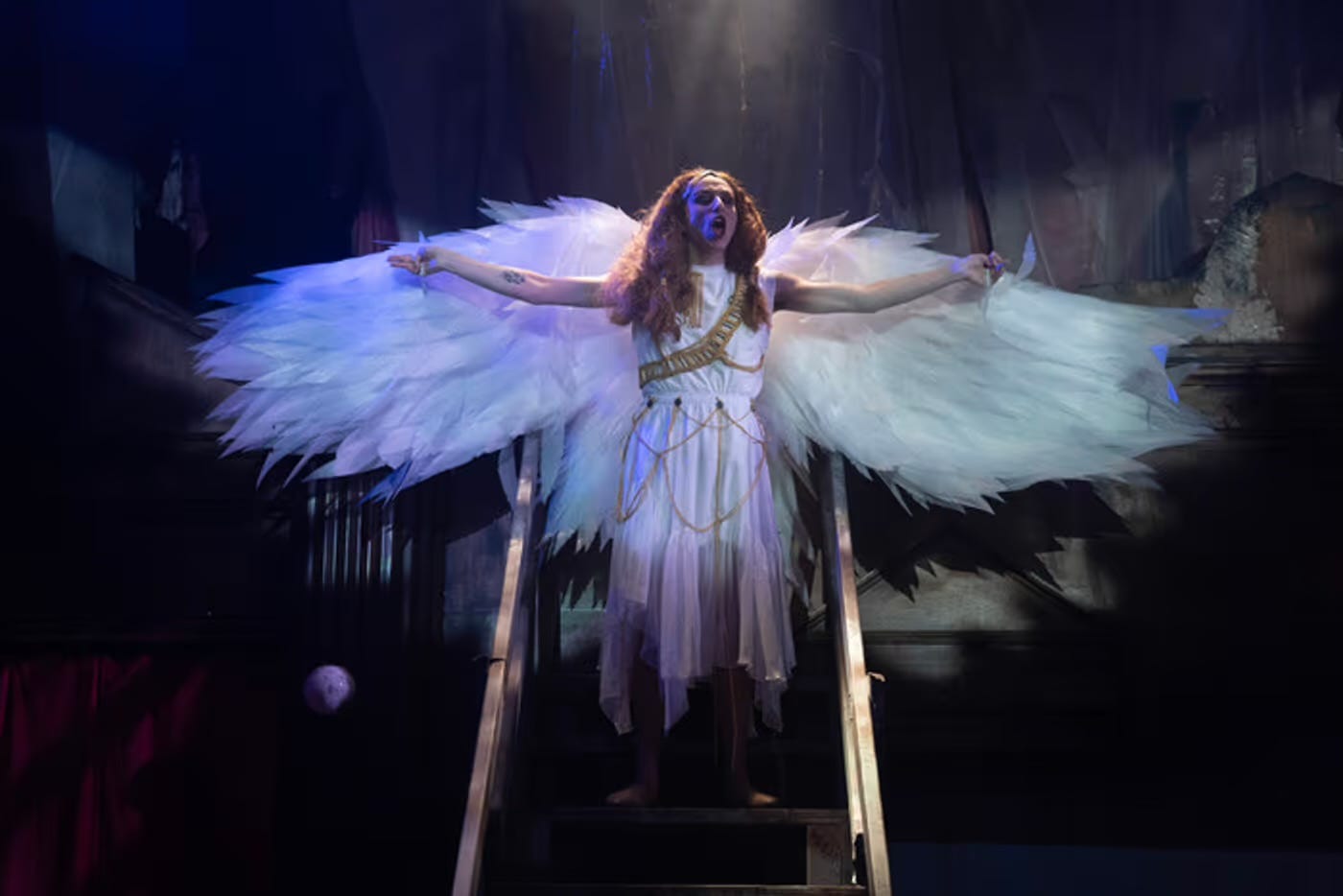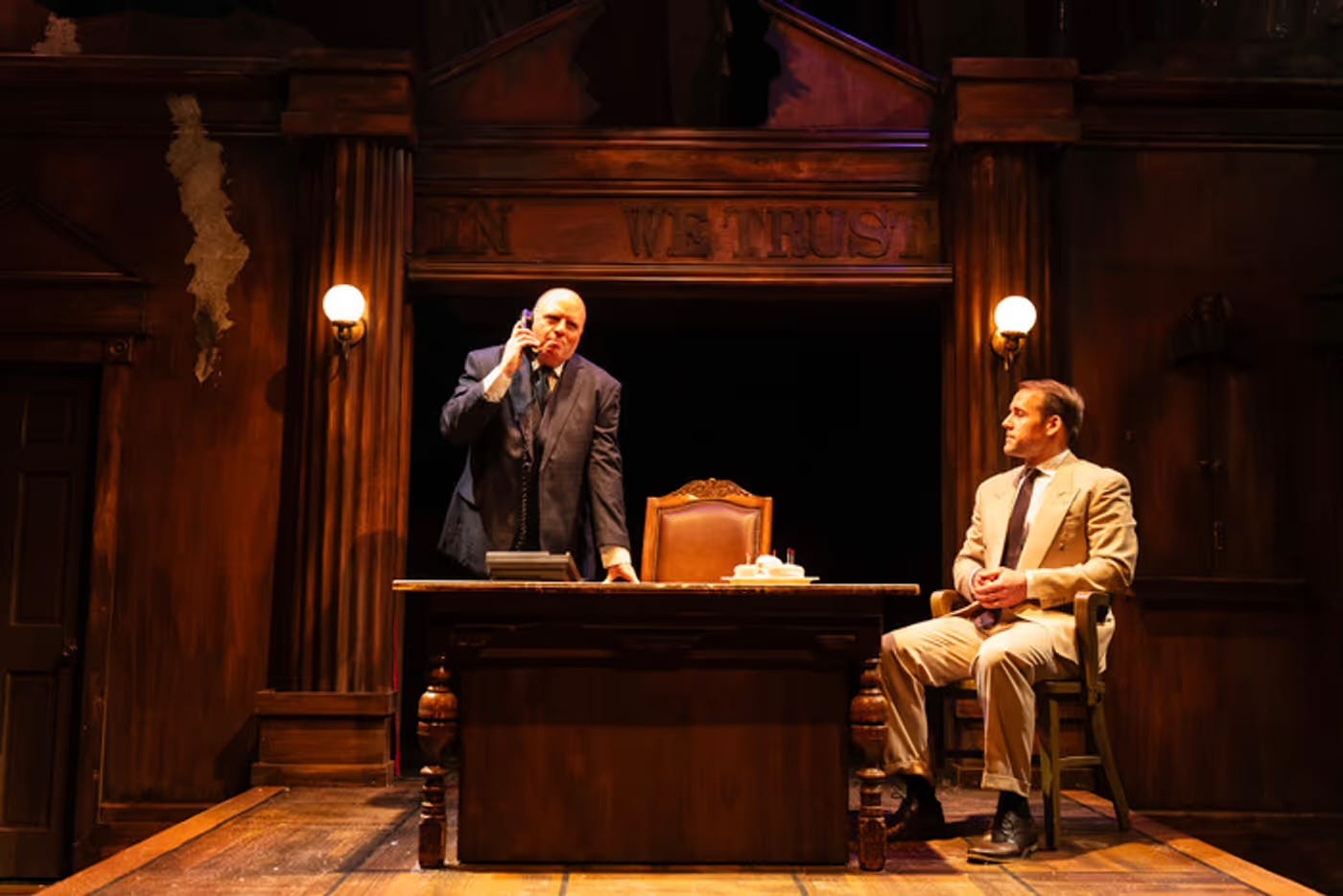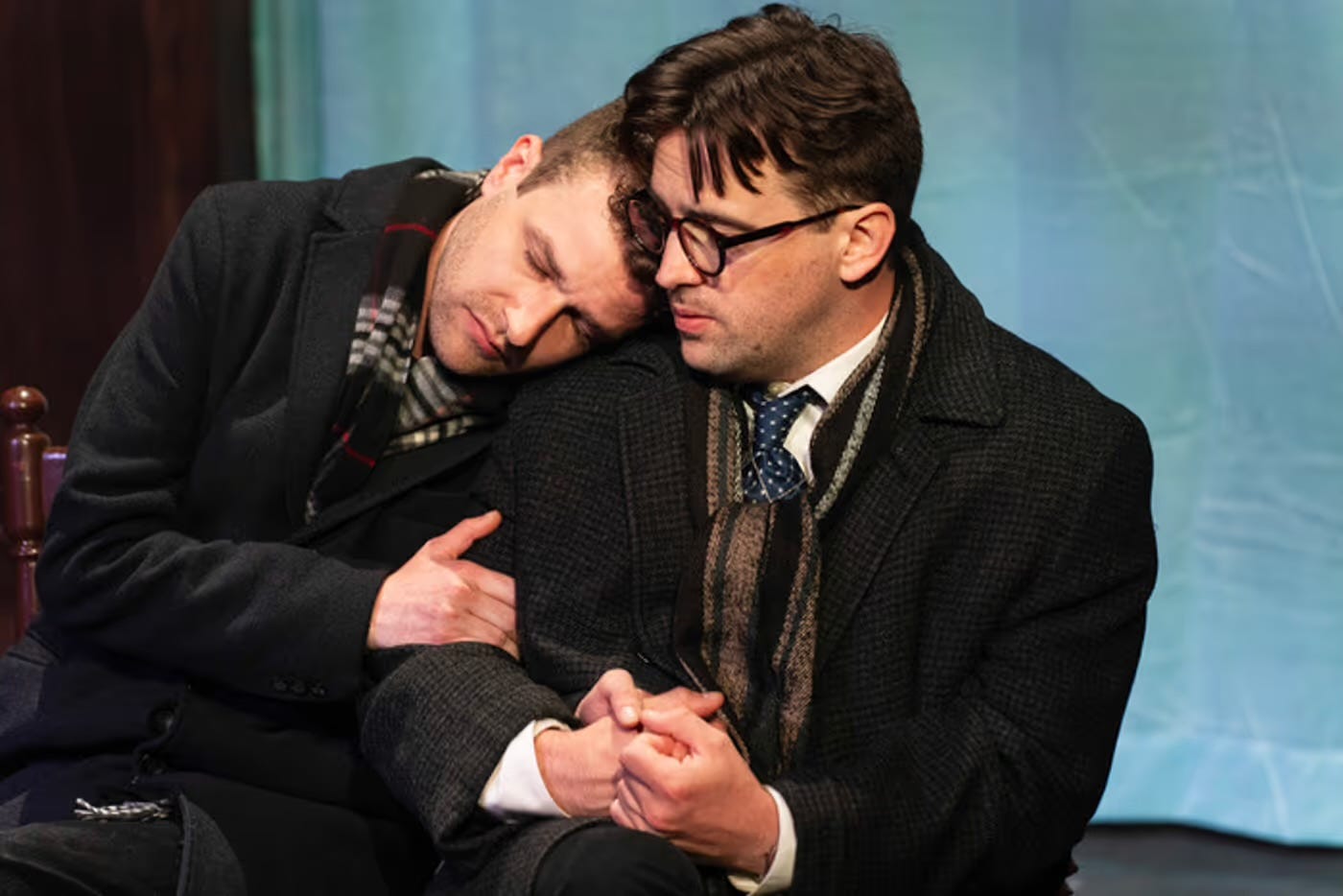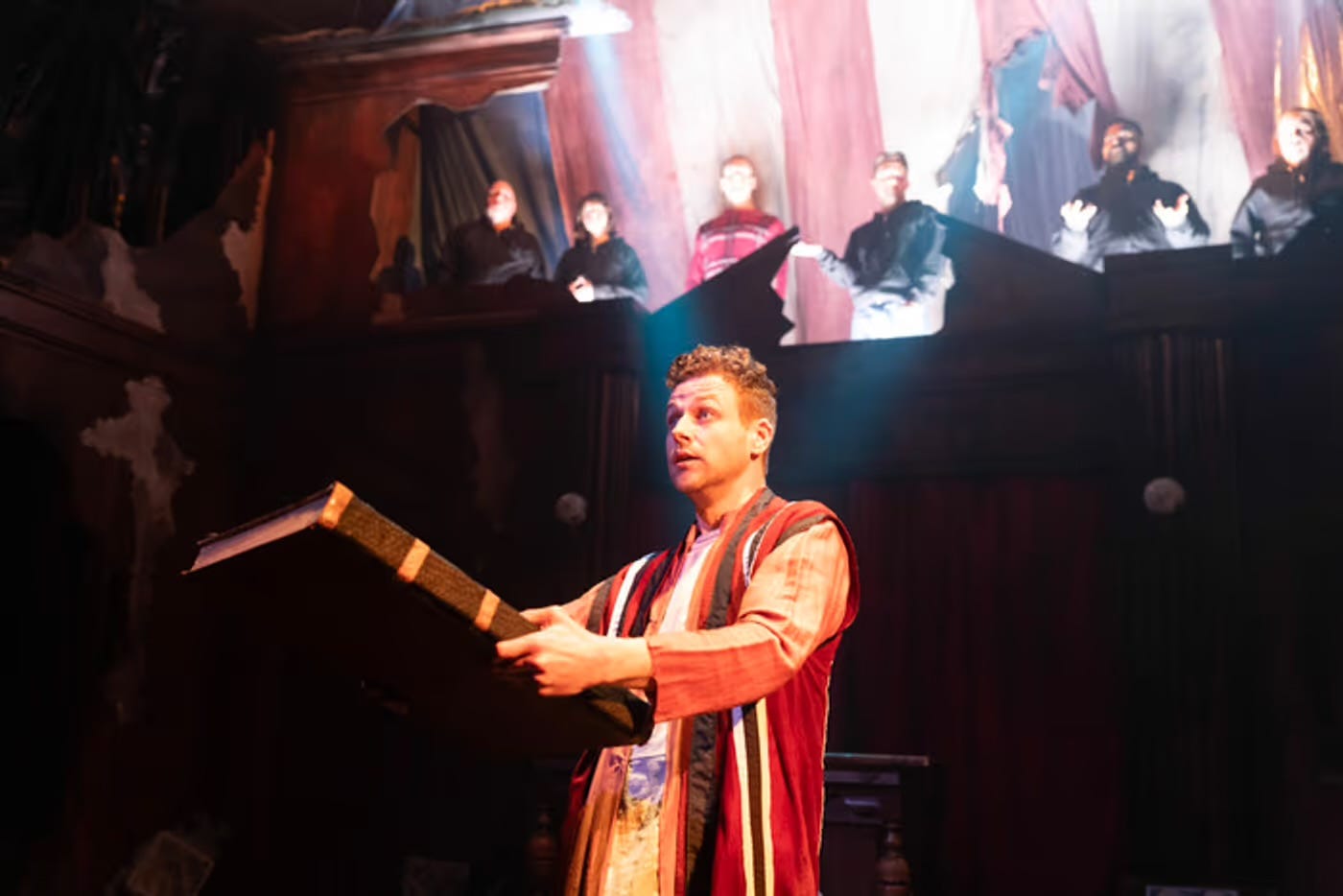Angels in America is a Magnificent Marathon
Invictus Theatre Mounts the Epic Two Part Play That Puts America Front and Center
As I drove home from a weekend theatre trip in Chicago, I saw a fireworks sale sign. A staple for the end of June in preparation for the approach of the 4th of July. The most patriotic US holiday, where we grill meat, set things on fire, and slap the stars and strips on everything from pinwheels to swimming suits. It was at this moment a phrase whispered in my mind…
“You do not live in America. No such place exists.”
It is this phrase that haunted me all the way from the Windy City, through Indiana, and back to Ohio where it took up residence in my home and resides here still, knocking on the walls as I try to sleep.
What is America?
This is what Tony Kushner asks in his monumental two-part play Angels in America, ambitiously produced by Invictus Theatre Company. Invictus has come out swinging in full force, putting everything they have into producing this grand American epic piece of theatre, and boy do they deliver. At each break I discovered I had been holding my breath from the tension.
The construction of Angels is ominous. The set is a crumbling court house, with the beams and poles of the building’s foundation exposed. Large, opaque plastic tarps are draped everywhere. Whether this court house is being built or slowly destroyed is up to individual interpretation. The words “IN ___ WE TRUST” are displayed front and center on the set and a projector adds the glowing word “GOD,” only to take it away at the start of the play and is never added again. A provocative start, but it sets the tone: Angels will not be pulling their punches.
Plays are hard. I love musicals, but there are lots of things to focus on in a musical: beautiful singing, impressive dancing, or a flying car that is thee moment of the show. In plays there is nowhere to hide. Actors are exposed and must deliver authentic portrayals otherwise the story falls flat. The cast of Angels in America charge onto the stage to do battle, armor-less, skin-exposed and do not leave until they have left their still-beating heart on the floor. This troupe of actors hold nothing back in these triumphant and raw performances that are some of the finest I have ever seen on a Chicago stage.
We start with an end, opening at a funeral where a Rabbi delivers a eulogy. Renae Stone instantly sets the tone as the bearded Rabbi with a voice so commanding she could tell the trash to take itself out and it would do so in record time. As Joe Pitt’s mother, Stone is a hurricane-like force relentlessly powering through any and all obstacles her character faces, sometimes bending and other times breaking them. Stone’s command of the stage is magnificent.
We then leave the funeral and go to an office where we meet Roy Cohn (yes, that Roy Cohn), wheeling and dealing on the phone, played by Jeff Award winner Michael D. Graham. Graham is captivating as Cohn, even when you don’t want him to be. Graham’s command of speech is flat-out impressive; as he starts talking, you quickly realize how Roy Cohn gained influence over so many people. He is charming and friendly and then becomes a rabid dog, biting down hard and refusing to let go. Graham pulls out the monster of Cohn in full daylight for us all to see and never lets his foot off our necks. His performance is outstanding.
Joe Bushell plays the all-American poster child, Joe Pitt. Joe is just a man trying his best to be good and you feel that in every word Bushell utters. Bushell coats his speech in a choking “straight” jacket that sheds light on a pained sorrow deep inside him. You see the little boy he still is, alone and doing his best despite how the world makes him feel. Bushell’s impressive balancing act of anger, torment, and innocent charm makes for a harrowing performance. Then we meet Joe’s wife Harper, played by Anne Trodden and we see a whole new side of Joe Pitt.
From the second that Anne Trodden stepped on stage I was mesmerized. Trodden plays Harper Pitt with a wide-eyed, sleep-deprived, erratic delivery that is chillingly powerful. Harper haunts the apartment she and her husband live in, speaking in a monotone voice and relentlessly questioning her husband Joe, desperate for connection. Perhaps it’s all the Valium pills Harper has been taking one, two, three or more times a day in order to suppress her loneliness. Trodden is heartbreaking and hilarious. As the show progresses, her depression manifests in a blunt, dry humor that makes you love her and see a glimmer of hope that things could change for her. Trodden and Bushell are thrilling as they effortlessly escalate volley arguments; it’s like watching two tennis pros go at it. You never know who or when the the final devastating blow will be delivered.
Jumping back to the funeral we meet Prior and Louis, a gay couple facing Prior’s diagnosis with AIDS. Grant Carriker as Louis is sympathetic as he begs his partner not to die. You feel the paralyzing fear in his voice desperate for his partner to get better despite what they both know to be the reality. Carriker’s Louis goes on a journey that left me questioning: what does it mean to survive? Are the choices we make in the name of survival worth it? And, what does the word “love” mean? Carriker is given a long list to achieve in Angels and not all of his character’s actions are redeemable, but that’s what makes him exceptional in the role. He fully leans into his character’s insecurities and makes sense of the choices Louis makes, even the ones with consequences.
Speaking of roles with tall orders, let’s talk about Ryan Hake as Prior Walter. Prior has to be one of the greatest modern theatrical roles ever written, and Hake squeezes every last drop out of it in his tour de force performance. Hake starts the show as a confident and sarcastic gay man who quickly falls into despair and decay as he suffers from AIDs. Hake delivers in every moment, from distressing and desperate where he literally begs for help off the floor to delusional hilarity as he tries to ward off mystical visions with a holy water spray bottle like one would a poorly-trained house cat. For me though, Hake’s triumph in Angels is the final speech he gives at the end of Part 2. Hake draws in the audience and transcends performance, achieving true human connection at the close of the show. It catapulted me out of my seat and onto my feet to give a standing ovation that I hope communicated pure gratitude and an intoxicated inspiration. Consider me a Ryan Hake fan from now on.
As the otherworldly Angel, Nicki Rossi is enchanting. I won’t spoil everything she does, but her voice is terrifying and beautiful. She speaks in a delicate tone that is warm and inviting, only to transform into a beastly bellow that makes your neck hair stand up on end. Rossi invokes an unpredictable impish nature that always kept me wondering what would happen next.
Finally, I wanted to close out with Miguel Long as Belize, the friend and nurse to so many of the characters in Angels. All of the performances in this production are bombastic and wonderful, but Long’s performance is the one that pulled me back to reality after fantastical fantasies or epic arguments. What is happening in Angels has happened before and while it is devastating, Belize is not surprised by it. Long’s speech in Part 2 made my blood go cold and opened my eyes to a view of America I had never considered. It plays on repeat in my mind. Miguel Long’s performance is nuanced and critical to the message of Angels in America.
Invictus Theatre has hit a grand slam in terms of talent. This cast rises to and exceeds the challenge of bringing this epic to life in a must-see run. Angels will challenge you, but it will also give you insight and hope. It is an examination of an 80’s America that mirrors our current world, showing how little progress has occurred but also reminding us of the massive victories we have fought for and won. In Angels we see cultures crossing paths and they clash like titans on the battlefield, but sometimes when these characters find themselves in the same room the hate disappears and bridges are built. There is hope for us to connect despite our differences. I have not stopped thinking about director Charles Askenaizer’s brilliantly crafted production, and I urge everyone to see it.
So, what is America?
America is the melting pot where nothing melted. We are the angels and the demons. We are the Jewish, the Mormon, the Catholics, the Muslims, the atheists, the tired, the poor, the huddled masses yearning to breathe free. We are all the immigrants because no such place as America exists. You’ll understand why at Invictus Theatre June 13th through September 7th.
Thank you for reading Thinking Theater. Your support is greatly appreciated as this work is made possible by your efforts and the generosity of the theater community. If you enjoyed this piece, please subscribe for free and consider sharing with friends, family, and pets.












I love those quiet whisper moments that flip our paradigms. I would love to see a production of this, and this one sounds like one to see!
Oh my gosh this is such a beautifully written review! I struggled so much to get my thoughts into words but you did it perfectly! I loved this play so much- I hope everybody who can get there does get there!